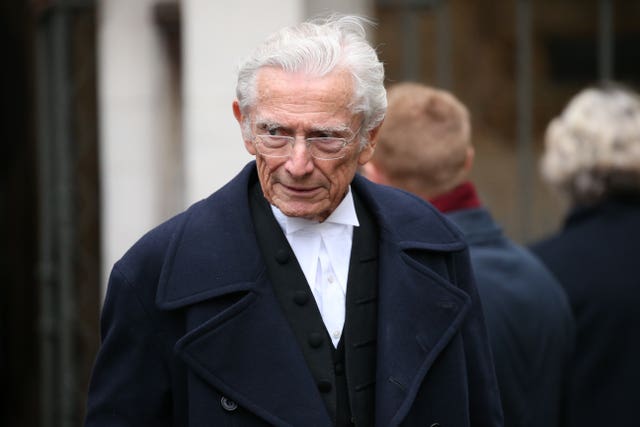Prime Minister Boris Johnson is facing a cronyism row after he appointed a Tory donor as a life peer despite concerns from watchdogs.
Mr Johnson brushed aside objections from the House of Lords Appointments Commission to elevate Tory former treasurer Peter Cruddas to the upper house.
Mr Johnson defended his nomination of Mr Cruddas in a letter to Appointments Commission chairman Lord Bew.

The Prime Minister rejected “historic concerns” raised about Mr Cruddas, relating to allegations that he offered access to then-prime minister David Cameron in exchange for donations.
Mr Johnson said: “The most serious accusations levelled at the time were found to be untrue and libellous,” and an internal Conservative Party investigation “found there had been no intentional wrongdoing”.
“Mr Cruddas has made outstanding contributions in the charitable sector and in business and has continued his long track record of committed political service,” the Prime Minister said.
“His charitable foundation, which supports disadvantaged young people, has pledged over £16 million to good causes through over 200 charities and he is a long-standing supporter of both the Prince’s Trust and the Duke of Edinburgh’s Award.”
Meanwhile, Lord Speaker Lord Fowler also voiced concerns about the number of peers appointed by the Prime Minister.

He said: “Mr Johnson has added 16 to his list of appointments bringing the total for the year up to 52 new peers over two lists.
“This list will bring the total in the House of Lords to over 830 – almost 200 more than the House of Commons.”
On the appointment of Mr Cruddas, a statement on the gov.uk website said: “The House of Lords Appointments Commission was invited by the Prime Minister to undertake vetting of all party political and cross-bench nominations.
“The commission is an independent non-statutory body. It provides advice but appointments are a matter for the Prime Minister.
“The commission has completed its vetting in respect of all nominees.
“The commission advised the Prime Minister that it could not support one nominee – Peter Cruddas.
“The Prime Minister has considered the commission’s advice and wider factors and concluded that, exceptionally, the nomination should proceed.”
Labour deputy leader Angela Rayner said: “After months of revelations about the cronyism at the heart of this Government, it’s somehow appropriate the Prime Minister has chosen to end the year with a peerage to Peter Cruddas.
“It’s never been more clear: there is one rule for the Conservatives and their chums, another for the rest of the country.”
Mr Johnson also appointed QC David Wolfson as a life peer and junior justice minister.
He has publicly backed the Prime Minister’s stance on controversial legislation.

The Lord Speaker said he would not comment on those appointed – apart from to welcome former archbishop of York John Sentamu – but added: “It may also now be the time to review the role and the powers of the House of Lords Appointments Commission.”
The other nominations for peerages from the Prime Minister were: Sir Richard Benyon, former junior environment minister; Daniel Hannan, ex-MEP; Dame Jacqueline Foster, ex-MEP; Stephanie Fraser, chief executive of Cerebral Palsy Scotland; Dean Godson, director of Policy Exchange; and Syed Kamall, ex-MEP.
The nominations from Labour leader Sir Keir Starmer were: Leeds City Council leader Judith Blake; ex-MP Jennifer Chapman; former schools minister Vernon Coaker; former MEP Wajid Khan; and chief executive of the Board of Deputies of British Jews, and former health minister, Gillian Merron.
Nominations for crossbench peerages were: former Master of the Rolls Sir Terence Etherton; ex-head of the diplomatic service Sir Simon McDonald; former MI5 head Sir Andrew Parker; and the ex-Archbishop of York, John Sentamu.




Why are you making commenting on The Herald only available to subscribers?
It should have been a safe space for informed debate, somewhere for readers to discuss issues around the biggest stories of the day, but all too often the below the line comments on most websites have become bogged down by off-topic discussions and abuse.
heraldscotland.com is tackling this problem by allowing only subscribers to comment.
We are doing this to improve the experience for our loyal readers and we believe it will reduce the ability of trolls and troublemakers, who occasionally find their way onto our site, to abuse our journalists and readers. We also hope it will help the comments section fulfil its promise as a part of Scotland's conversation with itself.
We are lucky at The Herald. We are read by an informed, educated readership who can add their knowledge and insights to our stories.
That is invaluable.
We are making the subscriber-only change to support our valued readers, who tell us they don't want the site cluttered up with irrelevant comments, untruths and abuse.
In the past, the journalist’s job was to collect and distribute information to the audience. Technology means that readers can shape a discussion. We look forward to hearing from you on heraldscotland.com
Comments & Moderation
Readers’ comments: You are personally liable for the content of any comments you upload to this website, so please act responsibly. We do not pre-moderate or monitor readers’ comments appearing on our websites, but we do post-moderate in response to complaints we receive or otherwise when a potential problem comes to our attention. You can make a complaint by using the ‘report this post’ link . We may then apply our discretion under the user terms to amend or delete comments.
Post moderation is undertaken full-time 9am-6pm on weekdays, and on a part-time basis outwith those hours.
Read the rules hereLast Updated:
Report this comment Cancel